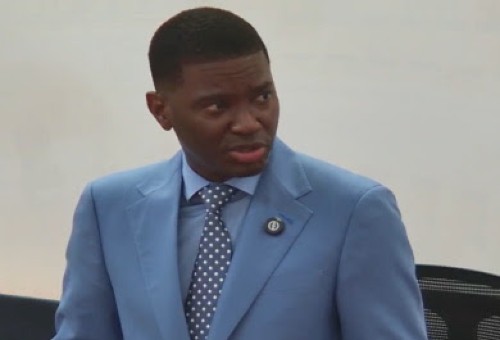ST. GEORGE’S, Grenada – Grenada's government on Tuesday said it would not enter into any agreement which has any possibility of violating regional, domestic or international law as the country continues to discuss a request from the United States to establish radar at Maurice Bishop International Airport (MBIA).
 Prime Minister Dickon Mitchell making statement to Parliament on Tuesday (CMC Photo)Prime Minister Dickon Mitchell in a statement to Parliament Washington had also indicated that it wished to have a response by a particular time, but that his administration has not been able to provide that response “for the simple reason that…from a technical point of view, we are not in a position to satisfy ourselves as to safety and other technical requirements, as to whether or not such equipment properly optically at the airport.
Prime Minister Dickon Mitchell making statement to Parliament on Tuesday (CMC Photo)Prime Minister Dickon Mitchell in a statement to Parliament Washington had also indicated that it wished to have a response by a particular time, but that his administration has not been able to provide that response “for the simple reason that…from a technical point of view, we are not in a position to satisfy ourselves as to safety and other technical requirements, as to whether or not such equipment properly optically at the airport.
“The other fundamental issue that we have to consider Mister Speaker is the fact that Grenada has no military, and therefore our cooperation with the US has always been the context of law enforcement and in the context of our own domestic law and in the context of international law.”
Mitchell told Parliament with opposition legislators boycotting the sitting that the public has engaged in “heated debate and discussions” in relation to the US request to erect the radar at the MBIA.
He said that in providing a context for the existing situation, Grenada has ongoing security cooperation and arrangements with the United States and its regional partners on almost all aspects of law enforcement matters, including combating the drug trade, human trafficking and the proceeds of narcotics trafficking through various legislative initiatives.
“Sometimes the corporation does extend to the US Southern Command, which is the military arm of the US, Mister Speaker, so cooperation with the US is an ongoing and permanent in the case of us.”.
He said that the request to install the radar is for further security cooperation, “some of which we’ve already agreed to, but which, because of the fact that we don’t want criminals to know what some of the arrangements for addressing crime we simply cannot disclose”.
Prime Minister Mitchell said the ongoing debate “is a clear indication of the fact that this government was fully aware that because of the nature of the request, that it could not proceed to make it definitive”.
He said that the site being requested by “its very history, is one that is historic of significance to the public, and one that evokes a lot of emotive reactions…and therefore, clearly we appreciate that the public will want to opine on this matter.
“Second, and perhaps more fundamentally important, the Maurice Bishop International Airport is a civilian airport, and therefore it is not equipped to treat with military type operations,” Mitchell said, adding that the installing of the radar would obviously disrupt the operations of the airport, “and we would need technical advice as to whether or not it was feasible or advisable to do so”.
Dickon said that when the Ministry of Foreign Affairs put out the statement indicating that the government is considering the US requests, it also meant paying attention to the technical aspect of the request and whether or not such a request could, in fact, be accommodated at the MBIA.
He said that technical assessment is still ongoing and that the request included first an opportunity for Southern Command to assess the site.
“…they have done so, and after having done so, they would have indicated that there were two sites that were interested in light of the ongoing discussions that we held with them on the technical issues”.
Mitchell said that they have come back and are interested, perhaps in one site.
“They have also indicated, Mister Speaker, that they wish to have a response by a particular time, we have not been able to provide that response for the simple reason…just from a technical point of view, we are not in a position to satisfy ourselves as to safety and other technical requirements, as to whether or not such equipment properly optically at the airport.”
Last month, Grenadians took to the streets in a peaceful protest, urging the government to blank the US request.
“We are here demanding that our region be maintained as a zone of peace,” former foreign affairs minister, Peter David, told the “Peace March” that was organized by the Grenada Coalition Zone of Peace and Concerned Citizens
David, an independent legislator, told the protest march, “we are not here to fight down anybody…we say Grenada first, the Caribbean first.
“This is not a partisan issue, this is an issue of sovereignty and integrity for the people of Grenada,” he said, adding “we all must be united on this”
The Donald Trump administration has been building up a military presence off the coast of the South American country allegedly as part of its fight against the illegal shipment of drugs to the United States. Washington has confirmed that it has bombed several vessels, killing all but two people, in recent times as it puts its policy into action.


